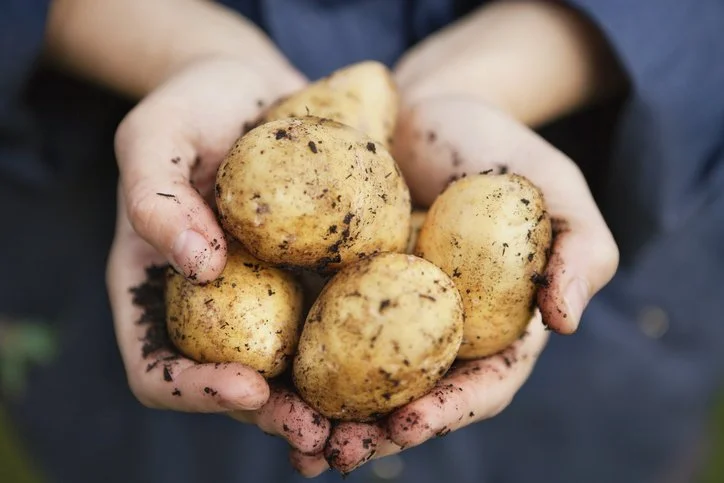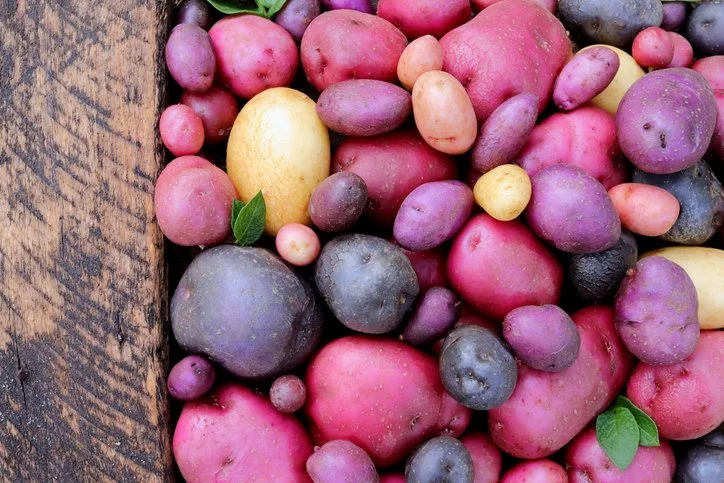Potato Power-Up: Ground Your Mind and Body, One Spud at a Time
By Joy Stephenson-Laws, Holistic Coach, J.D., Founder
Whether roasted, mashed, or baked, potatoes are a comforting staple in many diets. But beyond their delicious versatility, potatoes pack nutrients and compounds that can help steady your energy, support your digestion, and even boost your mood. In this post, you’ll learn why the humble potato deserves a spot on your plate—and how to turn everyday spuds into a simple, grounding ritual for both body and mind.
1. Why “Potato Power-Up”?
Easy energy: Potatoes contain complex carbohydrates that break down slowly, giving you steady fuel instead of sharp sugar spikes.
Rich in nutrients: One medium potato provides roughly half your daily vitamin C, plenty of potassium for muscle and nerve function, and B vitamins that support your metabolism.
Affordable and accessible: Potatoes grow around the world, store well, and fit into almost any budget.
All of these qualities make potatoes an ideal “power-up” when you need reliable energy without the crash of sugary snacks.
2. Steady Blood Sugar and Lasting Energy
When you eat simple carbs (like candy or soda), your blood sugar shoots up fast—then drops just as quickly, leaving you tired and hungry. Potatoes, by contrast, supply complex carbs and fiber that:
Slow the release of glucose into your bloodstream
Help you feel full longer
Support stable mood and focus throughout the afternoon
Tip: For the lowest blood-sugar impact, cook your potatoes, let them cool, then enjoy them cold or reheated. This process increases something called resistant starch, which behaves more like fiber in your gut.
3. Gut Health: Feeding Your “Good” Bacteria
Your gut is home to trillions of bacteria that influence digestion, immunity, and even brain function. Resistant starch in cooled potatoes can:
Serve as a prebiotic, feeding beneficial microbes
Increase production of short-chain fatty acids (like butyrate), which calm inflammation and support a healthy colon
Strengthen the gut lining, reducing “leaky gut” and helping you absorb nutrients more effectively
A recent study in Frontiers in Nutrition (2024) highlights how diets rich in resistant starch from potatoes and other sources can improve gut-brain signaling and reduce low-grade inflammation, key factors in both physical and mental health Frontiers.
4. The Gut-Brain Connection: Mood from the Microbes
Did you know your gut and brain constantly “talk” to each other? This bidirectional link means what happens in your gut can affect stress levels, anxiety, and overall mood. Here’s how potatoes fit in:
Resistant starch feeds gut bacteria.
Bacteria release short-chain fatty acids.
These fatty acids travel through your bloodstream to the brain.
In the brain, they help regulate neurotransmitters like serotonin, which influence mood and calmness.
In fact, a large population study published in Nature Communications (2024) found that people who closely followed plant-forward diets—rich in vegetables, whole grains, and potatoes—had lower rates of depression and anxiety over a five-year period Nature.
5. Rooted in Comfort: A Mind-Body Practice
Eating potatoes can be more than fuel—it can be a chance to ground yourself and practice mindfulness:
Choose your potato: Select a spud that feels firm and heavy in your hand.
Pause and breathe: Before cooking, hold it for a moment. Notice its texture, weight, and earthy scent.
Cook with care: As you boil, bake, or roast, focus on the process—watch the steam rise, listen for the sizzle, and imagine the nutrients being released.
Savor each bite: When it’s time to eat, take small mouthfuls. Chew slowly and notice flavors and textures. Feel gratitude for this simple, grounding food.
This ritual can anchor you in the present moment, helping reduce racing thoughts and bring a sense of calm.
6. Simple “Spud Power” Recipes
A. Cool-Then-Reheat Potato Salad
Boil cubed potatoes until just tender.
Drain and let cool in the fridge for 4–6 hours.
Toss with plain yogurt, chopped herbs (dill or parsley), and a squeeze of lemon.
Reheat gently or serve cold to maximize resistant starch.
B. Mindful Mashed Potatoes
Steam potatoes until soft.
Mash with a little olive oil or ghee.
Stir in a pinch of sea salt and fresh pepper.
As you mash, focus on the soothing, rhythmic motion—let it be a mini meditation.
C. One-Pot Potato and Veggie Stew
Sauté onion, garlic, and chopped carrots in a large pot.
Add diced potatoes and broth; simmer until everything is tender.
Season with thyme or rosemary.
Serve slowly, appreciating the warmth and nourishment.
7. Practical Tips for Stress Relief
Batch-cook potatoes at the start of the week. Having spuds on hand makes it easier to choose a grounding meal instead of a stressful fast-food run.
Pair with protein (beans, chicken, or tofu) and colorful veggies to balance nutrients and keep you full longer.
Stay hydrated: Potatoes are high in water. Drink plenty of fluids to aid digestion and circulation.
Listen to your body: Notice how you feel after eating potatoes prepared different ways—cold, reheated, mashed, or roasted. Find your favorite “power-up” style.
8. Closing Thoughts
Potatoes are far more than just comfort food. Their complex carbs, resistant starch, and rich nutrient profile can help stabilize blood sugar, feed your gut microbiome, and support a calmer mind. By turning routine cooking and eating into mindful moments, you deepen your connection to both body and earth.
Next time you peel, slice, or savor a potato, remember: you’re not just eating a spud—you’re grounding your energy, nurturing your gut, and powering up your well-being, one delicious bite at a time.
Sources
Frontiers in Nutrition (2024). “Resistant starches from dietary pulses improve neurocognitive function and gut-brain signaling.”
Nature Communications (2024). “Adherence to the EAT-Lancet diet and incident depression and anxiety.”
ScienceDirect (2023). “Resistant starch and the gut microbiome: Exploring beneficial modulation for health.”







